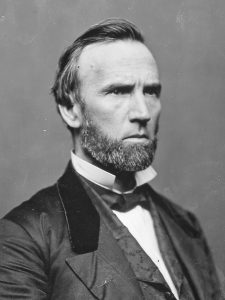
Photo info …
Credit: Mathew Benjamin Brady, Public domain, via Wikimedia CommonsView Source
(May 5, 1817-July 7, 1899). Born in Wayne 856 County, Indiana, and educated in the common schools, George Washington Julian entered the teaching profession at age 18. Admitted to the bar in 1840, he practiced successively in New Castle, Greenfield, and Centerville. He married Anne Elizabeth Finch in May 1845. Finch died of tuberculosis in November 1860. The couple had three children. Two of them died young. A third child, Frederick became an actor.
Julian married Laura Giddings the daughter of abolitionist and Ohio congressman, Joshua Reed Giddings, in December 1863. Julian had two children with Laura.
Guided by his moral convictions, Julian worked within the legal system and various political parties throughout his career to achieve his goals in connection to abolition, civil rights, and . He advocated for equal rights for all individuals. Julian’s daughter, , took up the cause of women’s suffrage and was a prominent Indianapolis club woman.
In 1845, Julian was elected to the Indiana House of Representatives as a Whig. Two years later he was defeated in his attempt to receive the Whig nomination for state senator. Opposed to repudiation of the state debt and to slavery, he joined the Free Soil party in 1848 and was elected to Congress. Defeated in his bid for reelection in 1850, Julian became the Free Soil vice-presidential running mate for John P. Hale in 1852.
Having attended the Pittsburgh convention that organized the in 1856, Julian was elected to Congress on its ticket in 1860. From 1861 to 1871, he served in Congress, where he became well-known as an advocate of abolition, civil rights, and women’s rights and suffrage. As chairman of the committee on public lands, Julian played a significant role in the passage of the Homestead Act. He was also a member of the committee on the conduct of the war.
In 1867 Julian was one of the committees of seven appointed by the House to prepare articles of impeachment against President Andrew Johnson. In 1868 he proposed an amendment to the Constitution in support of women’s suffrage. Defeated in the 1870 election, Julian joined the Liberal Republicans in 1872.
Leaving politics in 1873, he moved to the new Indianapolis suburb of where he practiced law. Having joined the , Julian was appointed surveyor-general of New Mexico by President Grover Cleveland in 1885. He served in this capacity until 1889. Julian published several notable works concerning the politics of the era, including (1884) and his father-in-law’s biography, (1892).

Help improve this entry
Contribute information, offer corrections, suggest images.
You can also recommend new entries related to this topic.

